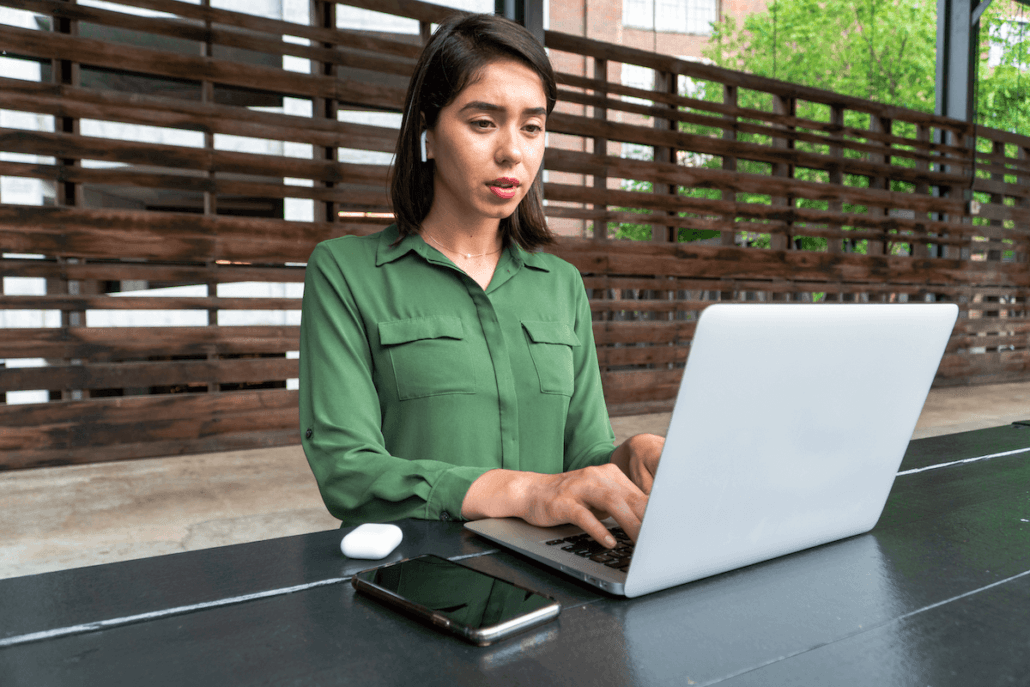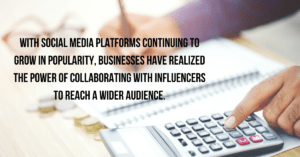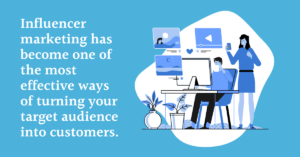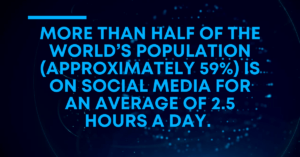Instagram influencer marketing spend is expected to hit ~$8 billion in 2020, and B2B marketers don’t want to leave the opportunity behind.
In fact, influencer marketing was number 4 on the list of B2B marketing trends for 2019, but many of us are used to seeing influencer marketing used strictly in B2C strategies–so it’s harder to imagine how it works for B2B.
A Linkedin report showed that B2B customers find expert opinions the second most persuasive factor in making a purchase, but only 15% of B2B brands use influencer marketing in their overall marketing strategy.
This means there’s a wide-open market for B2B companies to test and employ influencer marketing for a new avenue of driving revenue and increasing brand awareness.
Top 5 Tips for B2B Influencer Marketing
1. Utilize Your Existing Advocates
Many marketers think influencer marketing means automatically going outside your typical sphere of influence to find a traditional influencer, but there might be someone a lot closer than you think. One of the best ways to leverage influencers for B2B is to consider your existing product or service advocates.
Think of potential partnerships you can build with companies you already integrate well with. Look within your existing fans and advocates to determine if there’s an influencer/partnership fit. You can also work with existing customers and even employees to determine if there’s a good “influencer fit.” The jackpot is when a big name/brand in your industry uses your product or service already.
A good example of this is Microsoft’s tech evangelism program: “Evangelists engage with technical audiences to influence the adoption of Microsoft platforms and tools. By educating, enabling and exciting them to use Microsoft products and services, evangelists get to turn audiences into Microsoft advocates within their communities,” according to Microsoft’s job page. In essence, developers talking to developers.
Other big tech companies have something similar (Amazon has technical evangelists, Google has developer advocates, etc.). The idea is that developers and technology experts talk to others in their industry and get the audiences on board with your company’s new technology, solution, or innovation.
So, before automatically looking for the biggest name in your industry, see who may be an authentic, prominent influencer right at your doorstep already.
2. Consider What Influencers Your B2B Customers Already Follow
If you can’t leverage your own network and need to reach out to influencers outside your typical sphere, think of who your customers would already follow and where they’d follow them.
For example, if you’re an SEO software company, it makes sense that most of your target audience probably follows people like Rand Fishkin, Glenn Gabe, or Brittney Muller on Twitter.
In another example, Dell took advantage of their Luminaries Podcast to interview influencers in tech, not only to give those influencers a place to voice their thoughts, but to increase Dell’s own thought leadership around topics like blockchain in finance, artificial vision with AI, and more.
Each subject matter expert will share his or her feature on the podcast with their following (of loyal fans!) and both will mutually benefit. In this situation, Dell can also target their audiences to the specific audiences of their influencers.
“Year over year, we’ve seen consumer trust of brands decreasing, and people turning to seemingly more objective sources when making buying decisions: peers, third-party review sites, analysts, etc.,” says Whitney Magnuson, Global Head of Social Media and Influencer Programs at IBM. “Partnering with an influencer allows you to highlight your brand’s own existing narrative in a new way, so that you can reinforce the proof points you really want your customers to know.”
3. Be Aware of Potential Conflicts of Interest
As with B2C, there are always ways influencers can go against the values and mission of a brand. But there’s even more chance with B2B influencers that there could be potential conflicts of interest.
“The B2B influencer marketing segment is a lot more sensitive to corporate and brand loyalty conflicts, which is why you need to be very careful about who you eventually sign on,” according to the team at Single Grain.
With many B2C influencers, their job is to recommend products or services. However, in B2B it’s more likely that your influencer will have a job or company of his or her own (and they’ve become influential because of that job or company).
Make sure you have contracts and NDAs signed in advance to ensure there’s no potential leaking of sensitive brand or campaign information. Research should be an integral part of your B2B influencer discovery strategy to make sure that he or she hasn’t recommended competitor products in the past, gone against your brand values in one way or another, or doesn’t have any other conflict of interest.
4. Automate Data Collection Where You Can
Part of the legwork of influencer marketing for both B2B and B2C is doing all the background and research on an influencer. From there, you determine the best fits, reach out, and engage in campaigns.
If your B2B brand is newer to influencer marketing (and even if you’re experienced), Sideqik’s influencer marketing platform has everything you need to initiate and run a campaign. All in one tools like Sideqik mean that every step of the process is in one place and you can pick up right where you left off.
Sideqik helps B2B brands automate the collection of data like…
- Potential influencer audience reach
- Engagement numbers
- Campaign performance
- Media presence and overall reputation
- Hashtag relevancy
By automating and streamlining the process in a single place, you can ensure your B2B influencer marketing campaign encounters no hiccups and only drives revenue.
5. Branch Out Beyond Traditional Social Media
When many people think of “influencer marketing,” we often default to thinking about Instagram. However, influencer marketing can go beyond a single platform–and B2B influencer marketing can have even more significance because people go to many places to learn more about their industry and careers.
Oracle Dyn is a managed DNS service that wanted to create more awareness around their web security solutions. According to OnlyInfoTech, “To create awareness and credibility for this new cybersecurity capability, internal subject matter experts and relevant industry influencers including Eric Vanderburg and Kevin L. Jackson with authority in the cybersecurity space were engaged to collaborate on The Cybersecurity Intelligence Report: Bot Management and Mitigation.”
Not only did Oracle Dyn get the latest information from top experts to their target audience, but they included a promotional strategy to increase their reach and improve engagement.
With industry-focused podcasts, Twitter chats, YouTube Channels, blogs, Slack communities, in-person meetups and conferences, and more, your B2B influencer marketing options can actually include much more than Instagram. This means there’s even more room for influencer and revenue.
To learn more about how Sideqik can help with your B2B influencer marketing strategy and campaign, schedule a personalized demo with one of our experts.
Nancy Rothman
Latest posts by Nancy Rothman (see all)
- How Travel Brands Can Use Influencer Marketing to Stay Afloat as the Pandemic Continues - February 22, 2022
- Influencer Marketing Trends to Watch (And Prepare For) in 2022 - December 31, 2021
- A Guide: How to Recruit the Right Influencers for Your Brand - December 30, 2021







